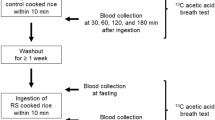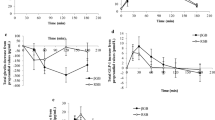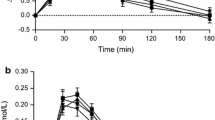Abstract
Background/objectives
Consumption of whole vs. refined grain foods is recommended by nutrition or dietary guideline authorities of many countries, yet specific aspects of whole grains leading to health benefits are not well understood. Gastric emptying rate is an important consideration, as it is tied to nutrient delivery rate and influences glycemic response. Our objective was to explore two aspects of cooked rice related to gastric emptying, (1) whole grain brown vs. white rice and (2) potential effect of elevated levels of slowly digestible starch (SDS) and resistant starch (RS) from high-amylose rice.
Subjects/methods
Ten healthy adult participants were recruited for a crossover design study involving acute feeding and testing of 6 rice samples (50 g available carbohydrate). Gastric emptying rate was measured using a 13C-labeled octanoic acid breath test. A rice variety (Cocodrie) with high-amylose content was temperature-cycled to increase SDS and RS fractions.
Results
In vitro starch digestibility results showed incremental increase in RS in Cocodrie after two temperature cycles. For low-amylose varieties, SDS was higher in the brown rice form. In human subjects, low-amylose and high-amylose brown rice delayed gastric emptying compared to white rices regardless of amylose content or temperature-cycling (p < 0.05).
Conclusions
Whole grain brown rice had slower gastric emptying rate, which appears to be related to the physical presence of the bran layer. Extended gastric emptying of brown rice explains in part comparably low glycemic response observed for brown rice.



Similar content being viewed by others
References
Dietary Guidelines Advisory Committee, US Department of Agriculture. Scientific report of the 2015, Dietary Guidelines Advisory Committee; 2015.
Kristensen M, Toubro S, Jensen MG, Ross AB, Riboldi G, Petronio M, et al. Whole grain compared with refined wheat decreases the percentage of body fat following a 12-week, energy-restricted dietary intervention in postmenopausal women. J Nutr. 2012;142:710–6.
Ye EQ, Chacko SA, Chou EL, Kugizaki M, Liu S. Greater whole-grain intake is associated with lower risk of type 2 diabetes, cardiovascular disease, and weight gain. J Nutr. 2012;142:1304–13.
Tighe P, Duthie G, Vaughan N, Brittenden J, Simpson WG, Duthie S, et al. Effect of increased consumption of whole-grain foods on blood pressure and other cardiovascular risk markers in healthy middle-aged persons: A randomized controlled trial. Am J Clin Nutr. 2010;72:733–40.
Lattimer J, Haub M. Effects of dietary fiber and its components on metabolic health. Nutrients. 2010;2:1266–89.
Hallfrisch J, Behall KM. Mechanisms of the effects of grains on insulin and glucose responses. J Am Coll Nutr. 2000;19:320S–325S.
Champagne ET, (ed). Rice: chemistry and technology. 3rd edn. St. Paul, MN: American Association of Cereal Chemists; 2004.
Foster-Powell, Holt SH, Brand-Miller JC. International table of glycemic index and glycemic load values: 2002. Am J Clin Nutr. 2002;76:5–56.
Sun Q, Spiegelman D, van Dam RM, Holmes MD, Malik VS, Willett WC, et al. White rice, brown rice, and risk of type 2 diabetes in US men and women. Arch Intern Med. 2010;170(11):961–9.
Brand-Miller J, Pang E, Bramall L. Rice: a high or low glycemic index food? Am J Clin Nutr. 1992;56:1034–6.
Horowitz M, O’Donovan D, Jones KL, Feinle C, Rayner CK, Samsom M. Gastric emptying in diabetes: clinical significance and treatment. Diabet Med. 2002;19:177–94.
Marathe CS, Rayner CK, Jones KL, Horowitz M. Relationships between gastric emptying, postprandial glycemia, and incretin hormones. Diabetes Care. 2013;36(5):1396–405.
Clegg ME, Ranawana V, Shafat A, Henry CJ. Soups increase satiety through delayed gastric emptying yet increased glycaemic response. Eur J Clin Nutr. 2013;67(1):8–11.
Geliebter A, Grillot CL, Aviram-Friedman R, Haq S, Yahav E, Hashim SA. Effects of oatmeal and corn flakes cereal breakfasts on satiety, gastric emptying, glucose, and appetite-related hormones. Ann Nutr Metab. 2015;66:93–103.
Bornhorst GM, Chang LQ, Rutherfurd SM, Moughan PJ, Singh RP. Gastric emptying rate and chyme characteristics for cooked brown and white rice meals in vivo. J Sci Food Agric. 2013;23:2900–8.
van Avesaat M, Troost FJ, Ripken D, Hendriks HF, Masclee AAM. Ileal brake activation: macronutrient-specific effects on eating behavior? Int J Obes. 2015;39(2):235–43.
Siegle ML, Schmid HR, Ehrlein HJ. Effects of ileal infusions of nutrients on motor patterns of canine small intestine. Am J Physiol. 1990;259:G78–G85.
Haralampu S. Resistant starch—a review of the physical properties and biological impact of RS3. Carbohydr Polym. 2000;41(3):285–92.
Kerberg AÅ, Liljeberg H, Bjö I. Effects of amylose/amylopectin ratio and baking conditions on resistant starch formation and glycaemic indices. J Cereal Sci. 1998;28:71–80.
Zhu L, Gu M, Meng X, Cheung SCK, Yu H, Huang J, et al. High-amylose rice improves indices of animal health in normal and diabetic rats. Plant Biotechnol J. 2012;10:353–62.
Sparti A, Milon H, Di Vetta V, Schneiter P, Tappy L, Jéquier E, et al. Effect of diets high or low in unavailable and slowly digestible carbohydrates on the pattern of 24-h substrate oxidation and feelings of hunger in humans. Am J Clin Nutr. 2000;72:1461–8.
Goodfellow BJ, Wilson RH. A fourier transform IR study of the gelation of amylose and amylopectin. Biopolymers. 1990;30:1183–9.
Zhou X, Baik B-K, Wang R, Lim S-T. Retrogradation of waxy and normal corn starch gels by temperature cycling. J Cereal Sci. 2010;51(1):57–65.
Zhang G, Sofyan M, Hamaker BR. Slowly digestible state of starch: mechanism of slow digestion property of gelatinized maize starch. J Agric Food Chem. 2008;56(12):4695–702.
Patindol JA, Guraya HS, Champagne ET, McClung AM. Nutritionally important starch fractions of rice cultivars grown in southern United States. J Food Sci. 2010;75:H137–144.
Sanaka M, Yamamoto T, Nakayama S, Nagasawa K, Kuyama Y. Reliability of the time to maximal [13CO2] excretion and the half-[13CO2] excretion time as a gastric emptying parameter: assessments using the Wagner-Nelson method. J Smooth Muscle Res. 2007;43:201–9.
Sanaka M, Nakada K. Stable isotope breath tests for assessing gastric emptying: a comprehensive review. J Smooth Muscle Res. 2010;46:267–80.
Haycock GB, Schwartz GJ, Wisotsky DH. Geometric method for measuring body surface area: a height-weight formula validated in infants, children, and adults. J Pediatr. 1978;93:62–66.
Perri F, Pastore MA, Annese V. 13C-octanoic acid breath test for measuring gastric emptying of solids. Eur Rev Med Pharmacol Sci. 2005;9:3–8.
Englyst HN, Kingman SM, Cummings JH. Classification and measurement of nutritionally important starch fractions. Eur J Clin Nutr. 1992;46:S33–S50.
Englyst KN, Englyst HN, Hudson GJ, Cole TJ, Cummings JH. Rapidly available glucose in foods: an in vitro measurement that reflects the glycemic response. Am J Clin Nutr. 1999;69:448–54.
Reed M, Ai Y, Leutcher J, Jane JL. Effects of cooking methods and starch structures on starch hydrolysis rates of rice. J Food Sci. 2013;78:H1076–H1080.
Sanaka M, Yamamoto T, Kuyama Y. Retention, fixation, and loss of the [13C] label: A review for the understanding of gastric emptying breath tests. Dig Dis Sci. 2008;53:1747–56.
Wang Z, Ichikawa S, Kozu H, Neves MA, Nakajima M, Uemura K, et al. Direct observation and evaluation of cooked white and brown rice digestion by gastric digestion simulator provided with peristaltic function. Food Res Int. 2015;71:16–22.
Kong F, Oztop MH, Singh RP, McCarthy MJ. Physical changes in white and brown rice during simulated gastric digestion. J Food Sci. 2011;76(6):E450–7.
Linnebjerg H, Park S, Kothare PA, Trautmann ME, Mace K, Fineman M, et al. Effect of exenatide on gastric emptying and relationship to postprandial glycemia in type 2 diabetes. Regul Pept. 2008;151(1):123–9.
Pi-Sunyer X, Astrup A, Fujioka K, Greenway F, Halpern A, Krempf M, et al. A randomized, controlled trial of 3.0 mg of liraglutide in weight management. N Engl J Med. 2015;373(1):11–22.
Van Can J, Sloth B, Jensen C, Flint A, Blaak E, Saris W. Effects of the once-daily GLP-1 analog liraglutide on gastric emptying, glycemic parameters, appetite and energy metabolism in obese, non-diabetic adults. Int J Obes. 2013;38:784–93.
Acknowledgements
We would like to acknowledge the Ingestive Behavior Research Center, the Industry Fellows Program in the Department of Food Science, and the Whistler Center for Carbohydrate Research for their financial support in this work.
Author information
Authors and Affiliations
Corresponding author
Ethics declarations
Conflict of Interest
The authors declare that they have no competing interests.
Rights and permissions
About this article
Cite this article
Pletsch, E.A., Hamaker, B.R. Brown rice compared to white rice slows gastric emptying in humans. Eur J Clin Nutr 72, 367–373 (2018). https://doi.org/10.1038/s41430-017-0003-z
Received:
Revised:
Accepted:
Published:
Issue Date:
DOI: https://doi.org/10.1038/s41430-017-0003-z
- Springer Nature Limited
This article is cited by
-
A perspective on the benefits of consumption of parboiled rice over brown rice for glycaemic control
European Journal of Nutrition (2022)
-
Activation of gastrointestinal ileal brake response with dietary slowly digestible carbohydrates, with no observed effect on subjective appetite, in an acute randomized, double-blind, crossover trial
European Journal of Nutrition (2022)




